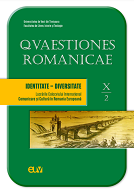« Nous » vs. « les autres ». La diversité insurpassable dans la littérature des « intrangers »
"Us" vs. "Others". Unsurpassed diversity in the literature of “intrangers”
Author(s): Ioana MARCUSubject(s): French Literature, Theory of Literature, Sociology of Literature
Published by: Universitatea de Vest din Timişoara
Keywords: diversity; other; marginalization; foreignness; strangeness;
Summary/Abstract: Diversity is most often seen as an enrichment factor. When people from different cultures, languages or spaces are brought together, it is believed that they will accept each other, that they will be able to collaborate, to get along. Their interaction would in this case result in a strong stimulation of creativity. However, it is difficult to envisage such a situation when the bringing into contact of two different categories of individuals, even unassimilable, occurs in a very specific circumstance – immigration (known as “from the South”) – and in a space specific – the periphery. In their literary productions, “intrangers” authors illustrate the difficulty experienced by individuals (of all origins) in accepting otherness. Hostile reception of the “other”, exclusion of the strange stranger (even within the family), exclusion of the “intruder” who does not master the same know-how as the other members of the group, etc., here is a whole series of conjectures testifying to the rejection of the diversity which they inscribe in their romantic works. In our contribution, we propose to illustrate this perspective from the novels Ils dissent que je suis une beurette (1993) by Soraya Nini, Mon père, ce harki (2003) by Dalila Kerchouche, Un homme, ça ne pleure pas (2014) by Faïza Guène and Ma part de Gaulois (2016) by Magyd Cherfi.
Journal: Quaestiones Romanicae
- Issue Year: X/2023
- Issue No: 2
- Page Range: 76-91
- Page Count: 16
- Language: French

